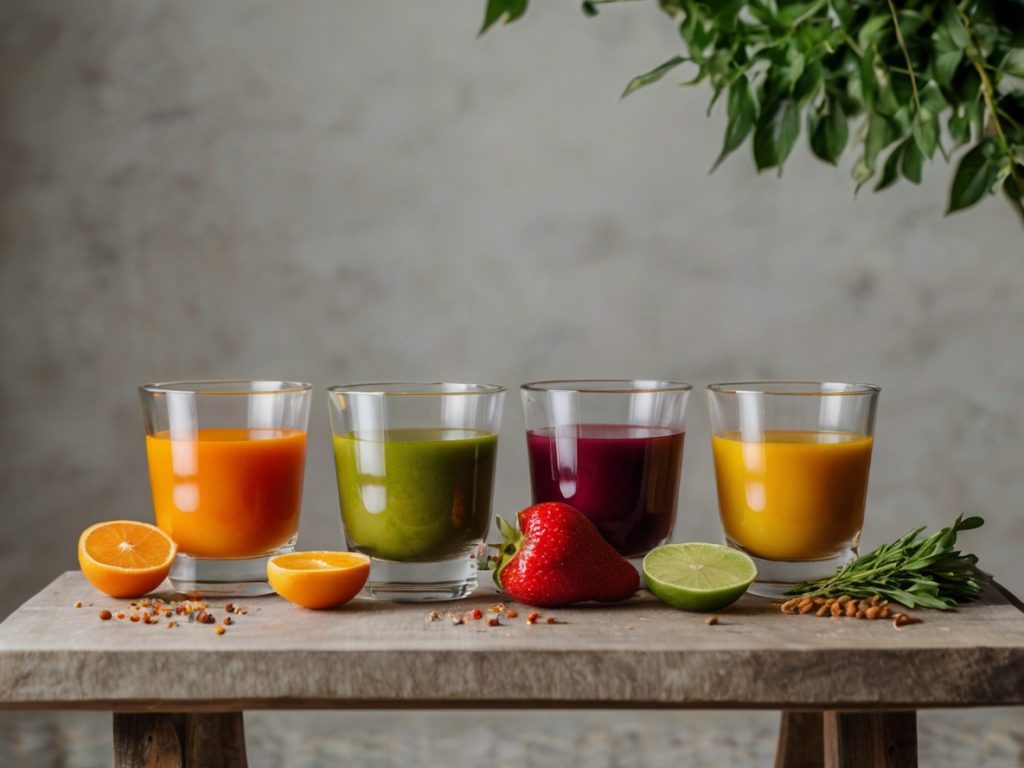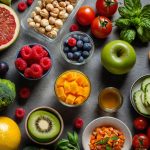Welcome to our comprehensive guide on organic foods. Are you curious about the benefits of natural products and how they can contribute to a healthier lifestyle? Have you ever wondered about the connection between organic foods and sustainable agriculture? Join us as we explore the world of organic foods and discover the secrets behind farm-to-table dining and sustainable farming practices. Get ready to challenge your beliefs and embark on a journey of healthier, more conscious eating choices.
Understanding Organic Foods
When it comes to making healthier eating choices, organic foods play a vital role. But what exactly are organic foods, and how are they produced? In this section, we will delve deeper into the world of organic foods, exploring the principles of sustainable farming and the importance of adopting an organic lifestyle.
What are Organic Foods?
Organic foods are agricultural products that are grown and processed without the use of synthetic pesticides, fertilizers, or genetically modified organisms (GMOs). Instead, organic farming relies on natural and sustainable practices that promote soil health, conserve water, and protect biodiversity.
The Principles of Sustainable Farming
Sustainable farming is at the heart of organic food production. It is a method of agriculture that aims to meet the needs of the present while preserving the ecosystem for future generations. Sustainable farming practices prioritize soil fertility, water conservation, and the responsible use of resources.
By avoiding synthetic chemicals and focusing on natural alternatives, sustainable farming minimizes the impact on the environment and promotes the long-term health of the soil. Organic farmers work with nature, harnessing natural processes and biodiversity to support crop growth and ensure the sustainability of their farming practices.
Adopting an Organic Lifestyle
Choosing organic foods goes beyond just the products we consume; it is a way of life. Embracing an organic lifestyle means making conscious decisions that prioritize health, sustainability, and supporting local farmers. It involves opting for organic produce, seeking out sustainably sourced ingredients, and embracing whole foods that are free from artificial additives and preservatives.
By choosing organic, we contribute to a healthier and more sustainable food system. We support farmers who adhere to environmentally friendly practices, protect our own health by reducing exposure to harmful chemicals, and promote the well-being of the planet.
The Benefits of Organic Foods
When it comes to living a healthier lifestyle, one of the key choices we can make is to incorporate organic foods into our diets. The demand for organic produce has been steadily increasing as more people recognize the benefits of clean eating and consuming whole foods.
Organic produce refers to fruits, vegetables, grains, and other agricultural products that are grown without the use of synthetic pesticides, fertilizers, or genetically modified organisms (GMOs). By choosing organic produce, we can reduce our exposure to harmful chemicals and ensure that what we consume is as natural and unprocessed as possible.
Clean eating, which involves consuming minimally processed foods, is key to maintaining a healthy lifestyle. Organic foods, being free from artificial additives, preservatives, and pesticides, align perfectly with the principles of clean eating. They provide us with essential nutrients while avoiding the potential health risks associated with consuming synthetic additives.
Furthermore, organic foods are whole foods, meaning they are in their natural form and have undergone minimal processing. This is in contrast to processed foods that often contain added sugars, unhealthy fats, and artificial ingredients. Whole foods are rich in vitamins, minerals, antioxidants, and fiber, which are essential for our overall well-being.
“Organic produce allows us to nourish our bodies with the purest, most wholesome ingredients, while also supporting sustainable agriculture and protecting the environment.” – Renowned chef and organic food advocate, Alice Waters
Advantages of Consuming Organic Produce
1. Nutritional Value: Organic fruits and vegetables are known to have higher levels of certain nutrients, such as vitamin C, iron, and magnesium.
2. Environmental Benefits: Organic farming practices prioritize sustainability, promoting soil health, conserving water resources, and minimizing the negative impact on ecosystems.
3. Better Taste: Many people report that organic foods have a richer and more natural flavor compared to conventionally grown produce.
The Significance of Clean Eating
1. Reduced Exposure to Chemicals: By choosing organic foods, we can avoid the consumption of synthetic pesticides and herbicides commonly used in conventional farming.
2. Improved Digestive Health: Whole foods, free from artificial additives and preservatives, can support a healthy gut and contribute to better digestion.
3. Weight Management: Clean eating with organic produce can help maintain a healthy weight due to lower calorie intake and higher nutrient density.
The Value of Consuming Whole Foods
1. High Nutrient Content: Whole foods are packed with essential vitamins, minerals, and antioxidants that nourish our bodies and support optimal health.
2. Satiety and Hunger Control: Whole foods, with their high fiber content, help keep us feeling full for longer, reducing the likelihood of overeating.
3. Disease Prevention: A diet rich in whole foods has been associated with a lower risk of chronic diseases, including heart disease, diabetes, and certain types of cancer.
| Benefits of Organic Foods | Advantages of Organic Produce | Importance of Clean Eating | Value of Whole Foods |
|---|---|---|---|
| Higher nutritional value | Higher nutrient levels | Reduced exposure to chemicals | High nutrient content |
| Environmental benefits | Environmental sustainability | Improved digestive health | Satiety and hunger control |
| Better taste | Weight management | Disease prevention |
Farm-to-Table: A Closer Look
In this section, we will explore the farm-to-table movement and its crucial role in promoting organic foods. At its core, farm-to-table is a philosophy that prioritizes fresh produce and locally sourced ingredients, highlighting the appeal of natural foods for health-conscious individuals.
Emphasizing Fresh Produce
One of the key principles of the farm-to-table movement is the emphasis on using fresh produce. By choosing locally sourced ingredients that are in season, we ensure that the food on our plates is bursting with flavor and nutrients. Fresh produce not only tastes better, but it also retains more of its nutritional value compared to produce that has traveled long distances.
Supporting Local Farmers
The farm-to-table movement is deeply rooted in supporting local farmers and agricultural communities. By purchasing from nearby farms, we not only contribute to the local economy but also reduce our carbon footprint. Locally sourced ingredients often require less transportation and refrigeration, resulting in fewer greenhouse gas emissions and a more sustainable food system.
“The farm-to-table movement connects us with the source of our food, allowing us to appreciate the hard work and dedication of local farmers.”
Promoting Natural Foods
Choosing farm-to-table means opting for natural foods that are free from harmful additives and pesticides. Locally sourced ingredients are often grown using sustainable farming practices, preserving the integrity of the ecosystem and protecting our health. By prioritizing natural foods, we nourish our bodies with wholesome ingredients that support our overall well-being.
The farm-to-table movement champions the idea that food should be a sensory experience, one that connects us to the earth and the people who cultivate it. By embracing fresh produce, locally sourced ingredients, and natural foods, we can make healthier choices for ourselves while supporting sustainable agriculture and local communities.
The Role of Sustainable Agriculture
Sustainable farming plays a pivotal role in the production of organic foods. It is a method of farming that focuses on long-term environmental, economic, and social sustainability. By adopting sustainable farming practices, farmers can ensure the health and well-being of the land, the community, and future generations.
One of the key aspects of sustainable farming is the use of organic produce. Organic farming relies on natural methods to grow crops and raise livestock without the use of synthetic pesticides, herbicides, or genetically modified organisms (GMOs). This results in food that is not only free from harmful chemicals but also more nutritious and flavorful.
Organic produce is grown using sustainable agriculture practices such as crop rotation, soil fertility management, and natural pest control. These methods help maintain soil health and productivity. By avoiding the use of synthetic inputs, organic farming reduces the risk of soil degradation and erosion, preserving the land for future generations.
Sustainable agriculture also promotes biodiversity. By cultivating a variety of crops and providing natural habitats for beneficial insects and wildlife, farmers create a balanced ecosystem that supports the natural food chain. This helps control pests and diseases without the need for chemical interventions.
“Sustainable agriculture is not just about producing organic food; it’s about cultivating a healthier planet for all living beings.”
– Jane Smith, Organic Farmer
Additionally, sustainable farming practices minimize water usage and prioritize water conservation. By implementing efficient irrigation systems, capturing rainwater, and managing water resources responsibly, farmers reduce their environmental impact and contribute to the overall health of water ecosystems.
The role of sustainable agriculture in the production of organic foods cannot be overstated. It not only ensures the availability of nutritious and chemical-free produce but also contributes to the conservation of natural resources and the well-being of our planet.
| Sustainable Farming Practices | Benefits |
|---|---|
| Crop rotation and diversification | Preserves soil fertility and reduces pests and diseases |
| Compost and manure management | Improves soil structure and nutrient content |
| Natural pest control | Reduces reliance on synthetic pesticides |
| Water conservation | Minimizes water usage and protects water ecosystems |
| Biodiversity conservation | Supports a balanced ecosystem and natural food chain |
Non-GMO and Organic: Understanding the Difference
When it comes to making healthier eating choices, terms like non-GMO and organic often come up. But what exactly do these terms mean? And how do they differ?
Non-GMO stands for “non-genetically modified organisms.” It refers to foods that do not contain genetically modified organisms (GMOs). GMOs are organisms whose genetic material has been altered in a way that does not occur naturally through cross-breeding or natural recombination. Non-GMO foods are produced using traditional breeding methods and do not undergo genetic modification.
On the other hand, organic foods refer to products that are produced using organic farming practices, which prioritize sustainable agriculture and environmental stewardship. Organic farming methods avoid the use of synthetic pesticides, fertilizers, growth hormones, and antibiotics. Instead, organic farming relies on natural methods to promote soil health, biodiversity, and the overall well-being of the ecosystem.
While non-GMO and organic foods may overlap to some extent, it is important to note that not all non-GMO foods are organic, and not all organic foods are non-GMO. Non-GMO certification focuses specifically on genetically modified ingredients, while organic certification encompasses a broader set of criteria for farming practices and ingredients.
In summary, non-GMO foods are those that do not contain genetically modified ingredients, whereas organic foods are produced using sustainable and environmentally responsible practices. By understanding the difference between non-GMO and organic, you can make more informed choices about the foods you consume and support the farming practices that align with your values.
Conclusion
We have explored the world of organic foods and the numerous benefits they offer. From understanding what organic foods are and how they are produced through sustainable farming practices, to the advantages of consuming fresh produce and whole foods, we have gained valuable insights into making healthier eating choices.
As our journey comes to an end, it is essential to emphasize the significance of supporting local organic markets. By doing so, we not only contribute to the growth of our communities but also have access to the freshest organic food options. The local organic market serves as a central hub for sourcing ingredients that are free from harmful pesticides and chemicals.
By prioritizing fresh organic food, we nourish our bodies with wholesome nutrients while supporting sustainable agriculture. Choosing organic means making a positive impact on our health, the environment, and our local communities. Let’s embrace the natural goodness of organic foods and join the movement towards a healthier and more sustainable future.
FAQ
What are organic foods?
Organic foods are products that are grown or produced without the use of synthetic chemicals, pesticides, or genetically modified organisms (GMOs). They are grown using sustainable farming practices that prioritize soil health, biodiversity, and ecological balance.
What are the benefits of consuming organic foods?
Consuming organic foods has several benefits. They are free from harmful pesticides and chemicals, making them healthier for human consumption. Organic foods are also richer in nutrients and are often fresher since they do not contain preservatives. Additionally, choosing organic foods supports sustainable farming practices and reduces the environmental impact of conventional agriculture.
How can I identify organic foods?
Look for products that have the USDA Organic seal. This certification ensures that the product meets strict organic standards. You can also check the labeling for phrases such as “100% organic” or “made with organic ingredients.” Additionally, shopping at local organic markets or directly from farmers can provide assurance of the organic nature of the products.
Are organic foods more expensive?
While organic foods can sometimes be more expensive than conventional alternatives, the prices have been steadily decreasing over the years due to increased demand and improved production methods. Investing in organic foods is an investment in your health and the environment. Consider prioritizing certain organic products, such as those with high pesticide residues, to reduce exposure to harmful chemicals.
How does organic farming contribute to sustainable agriculture?
Organic farming practices promote soil health, biodiversity, and long-term sustainability. By avoiding synthetic chemicals and GMOs, organic farmers contribute to the preservation of ecosystem balance and reduce soil degradation. Organic farming also supports pollinators and other beneficial organisms, ensuring the long-term health of our ecosystems.
Are non-GMO foods the same as organic foods?
Non-GMO (genetically modified organism) foods and organic foods are related but not the same. Organic foods cannot contain GMOs, but non-GMO foods may still be produced using synthetic chemicals or pesticides. While both eliminate GMOs, organic foods have stricter regulations and holistic production methods that focus on sustainable farming and environmental conservation.
How can I support local organic markets?
Supporting local organic markets is essential for the growth and sustainability of organic farming. You can become a regular customer at these markets, where you’ll find a variety of fresh, locally sourced organic produce and natural products. By purchasing from local growers, you help to build a strong community and support sustainable, environmentally friendly practices.







